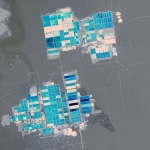Fracking Billionaire Faces Shareholder Anger

Aubrey McClendon, the founder and CEO of Oklahoma-based Chesapeake Energy, who championed natural gas to the extent of paying environmental groups to oppose coal, is facing angry shareholders for his profligate ways. Chesapeake is one of the leading users of fracking - an environmentally questionable method of extracting natural gas by injecting fluids underground at high pressure.
Chesapeake Energy, a 23-year old oil and gas company with 2011 sales of $11.64 billion, has bought up rights to drill on millions of acres of land in the U.S. This past March Rolling Stone magazine described the company thus: "It's not only toxic - it's driven by a right-wing billionaire who profits more from flipping land than drilling for gas," wrote Jeff Goodell. "McClendon's primary goal is not to solve America's energy problems, but to build a pipeline directly from your wallet into his."
McClendon aggressively promoted natural gas as part of the solution to climate change. He gave over $25 million to the Sierra Club's Beyond Coal campaign and in return former executive director Carl Pope even accompanied him to speak out in favor of natural gas. (The Sierra Club's new director, Michael Brune, has returned the remaining money)
But in the last four years, the company's share price has dropped from almost $67 in June 2008 to about $18 now because of the crash in natural gas prices as well as the company heavy debt load. Shareholders have forced McClendon to resign as chair and this Friday, they voted out a number of individuals that he appointed to the board of directors.
Well blow-outs and water contamination from fracking haven't helped the company's image or share prices either. Alarming incidents like tap water catching on fire started to bring national attention to the environmental impact of fracking in recent years. By 2011, even the New York Times started to investigate the matter. (CorpWatch raised these questions in 2005 in a partnership with the Oil and Gas Accountability Project)
Fracking uses a mix of water, sand and a variety of chemicals, many of which are dangerous to humans and the environment. A study by the U.S. Congress estimated that out of 2,500 hydraulic fracturing products "(m)ore than 650 of these products contained chemicals that are known or possible human carcinogens, regulated under the Safe Drinking Water Act, or listed as hazardous air pollutants."
Then there is the problem of waste waters. "Since there were no laws covering the disposal of this stuff at first, they (fracking companies) just dumped it into rivers or hauled it off to sewage plants to be 'treated,' which they knew didn't work," Deborah Goldberg, a lawyer at Earthjustice, told Rolling Stone. "They just wanted to get rid of the stuff as quickly and as cheaply as possible."
McClendon also brought attention to his company by funding right-wing causes like the Swift Boat attacks against John Kerry in 2004 and contributing more than $500,000 to stop gay marriage.
The latest scandal to entwine McClendon are his spendthrift ways. He shot to fame when he paid himself $112 million in 2008. Now Reuters has uncovered documents on how McClendon fused his personal expenses with that of the company.
"In 2010, Chesapeake employees spent more than 15,000 hours working on McClendon's personal projects at a cost of about $3 million," write John Shiffman, Anna Driver and Brian Grow. The journalists report that McClendon arranged for over $1.5 billion in personal loans using his interest in company-owned wells as collateral. He bought a house on Bermuda's so-called billionaire's row, which includes houses purchased by Michael Bloomberg, Ross Perot and Silvio Berlusconi.
He was generous with shareholder's money too. "On one flight, nine friends of McClendon's wife took a Chesapeake-leased jet to Bermuda without any McClendons aboard," Reuters reports.
Small wonder that Forbes magaine once called him "America's Most Reckless Billionaire." Today, it's a bit hard to shed a tear for his plunging fortunes.
- 183 Environment



